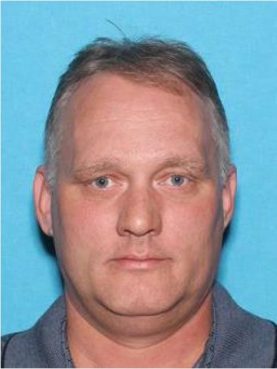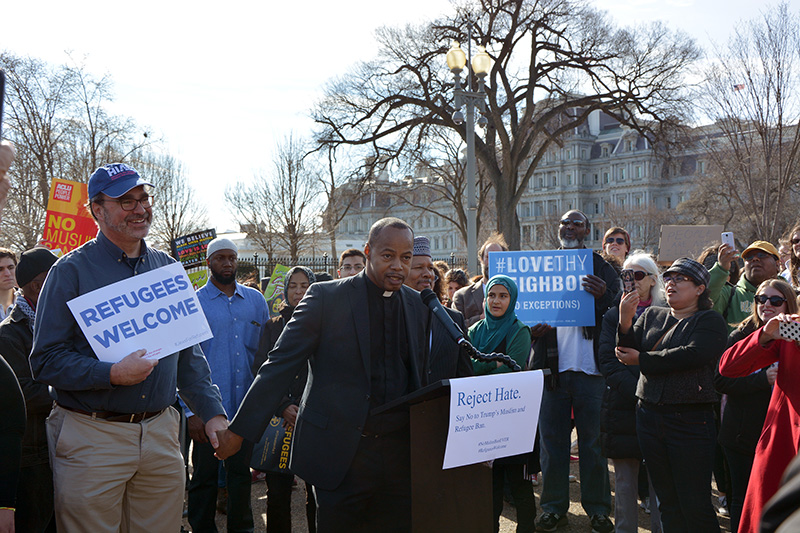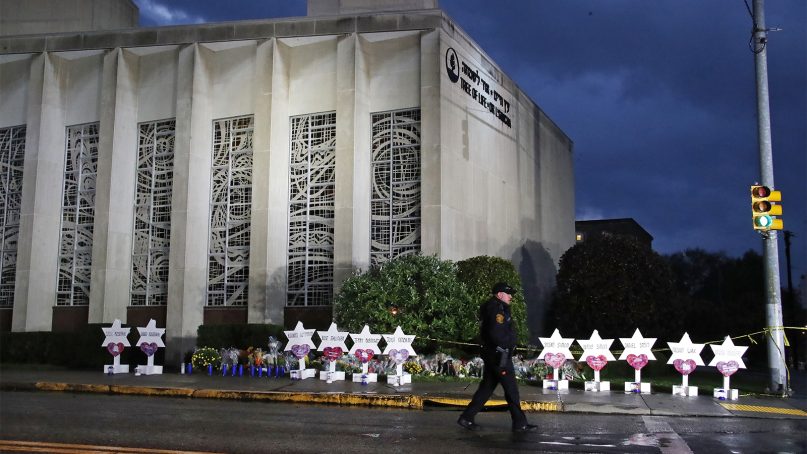(RNS) — No one knows yet why a gunman singled out the Tree of Life Congregation, out of all of Pittsburgh’s synagogues, as the site for a virulently anti-Semitic shooting spree.
But Robert Bowers, the man accused of gunning down 11 congregants in a rampage Saturday (Oct. 27) in the city’s Squirrel Hill neighborhood, was known to hate Jews and told a SWAT officer who confronted him that he “wanted all Jews to die.”
He also had a particular animus toward HIAS, the refugee resettlement organization, which sponsored a National Refugee Shabbat across the nation a week earlier. In social media posts, Bowers allegedly wrote that he “appreciated” the list of synagogues HIAS posted of congregations participating in the event.
One of those on the list was Congregation Dor Hadash, a small Reconstructionist synagogue that met in the Tree of Life building in Squirrel Hill.
Nearly 300 synagogues in the U.S. and Canada took part in the Oct. 19-20 observance intended to raise awareness of the worldwide refugee crisis.
On Saturday the week before the shooting, participating synagogues dedicated sermons to the refugee crisis, sang songs about refugees or invited refugee families to give their testimonies.
“We saw this as a moment that congregations could participate across the board regardless of their level of engagement with refugees,” said Merrill Zack, senior director of community engagement for HIAS, which stands for Hebrew Immigrant Aid Society. HIAS took down the list of congregations participating in the event shortly after the shooting.
Jerry Rabinowitz, one of the 11 people killed in the massacre, was a member of Dor Hadash. Another member, Dan Leger, was critically wounded. (The rest were members of the other congregations meeting at Tree of Life.)
While the massacre points to an already alarming rise in anti-Semitism — the Anti-Defamation League reported a 57 percent increase in anti-Semitic incidents in 2017 — the shooting suspect’s animus toward HIAS and fear of immigrants show how a combustible mix of factors led to the carnage.
The U.S. has seen a recent surge in disdain for groups that help the government resettle refugees — six of which, like HIAS, are faith-based.
Founded in the late 19th century, HIAS has helped to resettle more than 4.5 million people. Until the beginning of the 21st century, its main task had been to assist Jews in need. But that is no longer the case.
Over the past 10 years, HIAS has resettled more non-Jews and has taken particular pride of its work resettling Muslim refugees from Syria. It is one of nine voluntary agencies working with the State Department’s Office of Refugee Resettlement, alongside such groups as Lutheran Immigration and Refugee Services and the Church World Service.

This undated photo shows Robert Bowers, the suspect in the deadly shooting at the Tree of Life Synagogue in Pittsburgh on Oct. 27, 2018. Photo courtesy of Pennsylvania Department of Transportation
“HIAS likes to bring invaders in that kill our people,” Bowers reportedly wrote on social media. I can’t sit by and watch my people get slaughtered. Screw your optics. I’m going in.”
Bowers has been charged with 29 criminal counts, including obstructing the free exercise of religious beliefs — a hate crime, which can carry the death penalty.
He was far from alone in his contempt for refugees and resettlement agencies.
Groups such as Refugee Resettlement Watch, which runs a blog founded in 2007 that claims 6 million readers, have spent years railing against immigration. The Southern Poverty Law Center lists Refugee Resettlement Watch as an anti-Muslim hate group.
Refugee Resettlement Watch founder Ann Corcoran forcefully condemned the shooting as a “horrific act of violence against innocent people” in a recent post. But she couched the suspect’s anger toward HIAS as part of a larger “frustration.”
“Again, there is no excuse for violence, but there is great frustration out there that a serious effort to be more open and transparent with the public might begin to quell,” Corcoran wrote.
Bowers also reportedly shared anti-Muslim content on his Gab.com social media account. The site, popular with far-right extremists, was taken down Sunday.
More mainstream conservative voices have also been vocally critical of HIAS and other groups that aid refugees, especially Fox News talk show host Tucker Carlson.
Carlson has argued since at least 2014 that refugees “don’t have a moral right to American tax dollars” and that it’s “appalling” faith groups use federal money to resettle them.
He debated HIAS President Mark Hetfield on his show in January 2017, challenging the refugee advocate’s assertion that President Trump’s travel ban was an affront to American values. Carlson acknowledged that refugees are “in a tough spot” and “probably really good people,” but he described HIAS as taking tax dollars “by force” through the tax code and rebutted the idea that Americans who fear refugees are “crackpots.”

Mark Hetfield, left, from HIAS, with Church World Service interfaith advocacy minister the Rev. Reuben Eckels, protests the travel and refugee ban at the White House in Washington on Jan. 27, 2018. RNS photo by Jack Jenkins
Bowers frequently posted about the so-called migrant caravan, a group of several thousand refugees walking to the U.S.-Mexico border from Honduras. He apparently endorsed the false claim that Jews have been funding the Central American migrants and particularly George Soros, a Jewish political activist and philanthropist.
That weaving together of anti-Semitism with hatred for refugees and immigrants is familiar to Jews everywhere. And they will continue to fight it.
Bill Swersey, senior director of communications for HIAS, called the response to National Refugee Shabbat “extraordinary” and said about 425 congregations signed a commitment to help refugees, one way or another.
The date of the program was chosen after Trump set the refugee ceiling for the current fiscal year and before the midterm elections. Trump’s decision to admit 30,000 refugees — the lowest in the history of the U.S. refugee resettlement program, which started in the 1980s — united many Jewish groups.
National Refugee Shabbat also fell during a week when Jews read the story of God calling Abraham to leave his homeland to go to “the land I will show you.”
“We feel really committed to our values,” said Rabbi Deborah Waxman, president of Reconstructing Judaism, a small liberal Jewish denomination with which the Congregation Dor Hadash in Pittsburgh affiliates.
“We stand with HIAS. We stand with refugees,” Waxman added. “We stand with asylum-seekers. We stand with folks on the margins of society. We believe these are expressive of Jewish values that emerge from our core teachings and we want to enact them in our lives.”
(Emily McFarlan Miller contributed to this story.)





